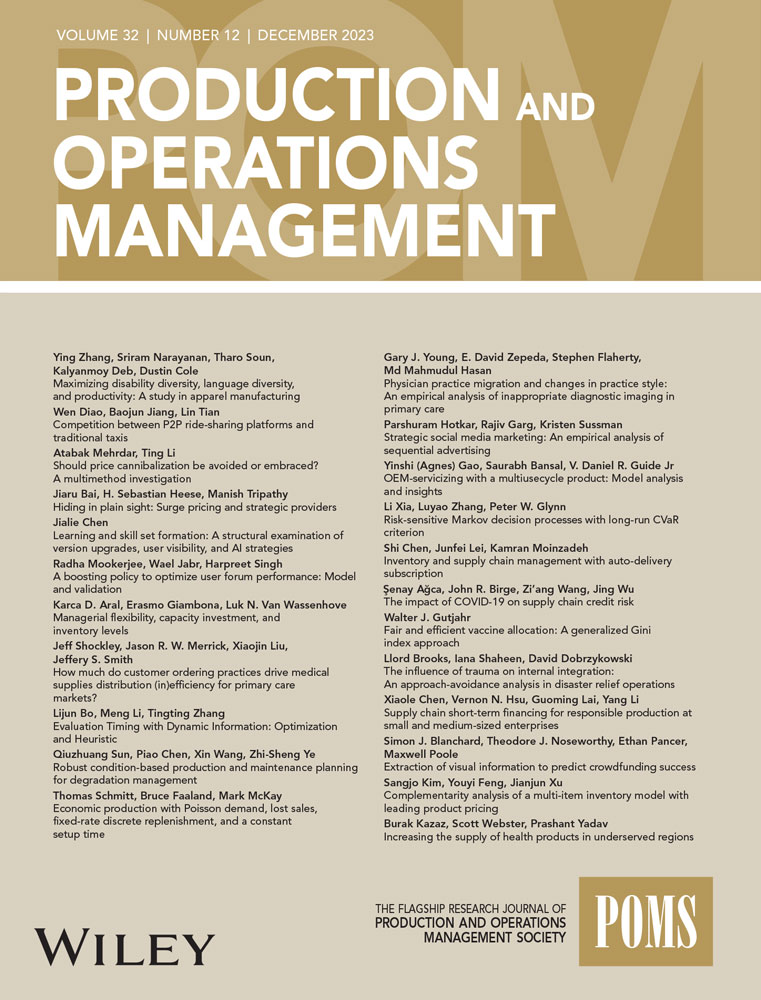薪酬透明度在过度自信和不自信的代理存在的影响
IF 5.1
3区 管理学
Q1 ENGINEERING, MANUFACTURING
引用次数: 0
摘要
许多公司都面临着提高薪酬透明度的压力;然而,它对他们的代理人和委托人的影响尚不清楚。为了研究薪酬透明度的利弊,我们基于代理人有“认知偏见”(即过度自信或不自信)的情况进行了研究。我们还捕获了薪酬透明度下发生的“社会比较”行为(即,向后厌恶和向前寻求)的概念。通过对一个委托人-两个代理人模型的研究,我们发现代理人的最优努力决策受到代理人的社会比较行为和认知偏差之间的“交集”的影响。具体来说,相对于不透明的政策,我们发现薪酬透明度可以吸引代理人提高他们的工作绩效(通常)。我们的分析也为校长正确实施透明的薪酬政策(包括最佳薪酬计划和招聘策略)提供了指导。具体来说,薪酬透明度可以使委托人提供较低的绩效因素水平,但比不透明的政策提供更高的基本工资水平来激励代理人。为了获得较高的留存收益,如果委托人选择不透明的政策,雇佣一个过度自信的代理人是有利可图的,但如果选择薪酬透明的政策,雇佣一个适度不自信的代理人是有利可图的。此外,我们扩展了基本模型,以纳入跨代理的工作能力异质性。我们发现,在透明政策下,当两代理人的工作能力具有可比性时,代理人的努力激励与其对手的工作能力是朝着同一方向运动的。最后,通过将环境的相对偏好纳入基本模型,我们观察到,当环境具有高度不确定性时,欠自信主体愿意利用环境的不确定性,而过度自信主体则愿意付出更多的努力。本文章由计算机程序翻译,如有差异,请以英文原文为准。
The implications of pay transparency in the presence of over‐ and underconfident agents
Abstract Many companies are under pressure to improve pay transparency; however, its impact on their agents and principals remains unclear. As a way to investigate the upside and downside of pay transparency, we conduct our study based on a scenario in which agents have “cognitive bias” (namely, over‐ or underconfident ). We also capture the notion of “social comparisons” behavior (namely, behind‐averse and ahead‐seeking ) that occurs under pay transparency. By exploring a one‐principal‐two‐agent model, we find that agents' optimal effort decisions are affected by the “intersection” between agents' social comparison behavior and cognitive bias. Specifically, relative to the opaque policy, we find that pay transparency can entice agents to improve their job performance (in general). Our analysis also provides a guideline for principals to implement transparent payment policies properly (including the optimal payment scheme and the recruitment strategy). Specifically, pay transparency could enable the principal to offer a lower merit‐based factor level but a higher base salary level than opaque policy to motivate agents. To obtain high retained earnings, it is profitable for the principal to hire an overconfident agent if the principal chooses to adopt the opaque policy, but hire a mildly underconfident agent if pay transparency is selected. Moreover, we extend the base model to incorporate working capability heterogeneity across agents. We find that the agent's effort incentive and his opponent's working capability move in the same direction when the two agents' working capabilities are comparable under the transparent policy. Finally, by incorporating the environment's relative favoritism into the base model, we observe that when the environment is highly uncertain, the underconfident agent is willing to leverage environment uncertainty but the overconfident agent is willing to exert more effort.
求助全文
通过发布文献求助,成功后即可免费获取论文全文。
去求助
来源期刊

Production and Operations Management
管理科学-工程:制造
CiteScore
7.50
自引率
16.00%
发文量
278
审稿时长
24 months
期刊介绍:
The mission of Production and Operations Management is to serve as the flagship research journal in operations management in manufacturing and services. The journal publishes scientific research into the problems, interest, and concerns of managers who manage product and process design, operations, and supply chains. It covers all topics in product and process design, operations, and supply chain management and welcomes papers using any research paradigm.
 求助内容:
求助内容: 应助结果提醒方式:
应助结果提醒方式:


